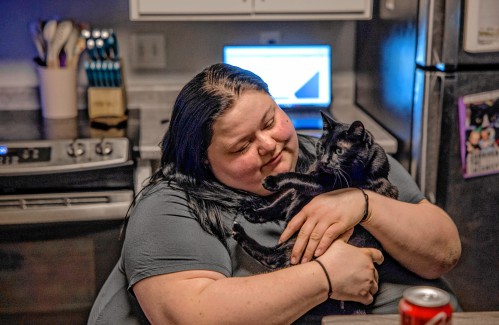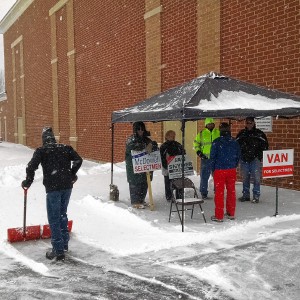
‘A sense of relief’ — Amid rising tensions over immigration, over 70 newly naturalized citizens rejoice at Concord ceremony
Dinorah Mull hadn’t thought twice about her three decades in the United States.

‘We need all of you’ – New Hampshire lacks more foster families. Local recruitment efforts are trying to change that
Before Maddie Lemay went to prom, she had a checklist of adults she needed to ask for permission.
Most Read
 ‘I thought we had some more time’ – Coping with the murder-suicide of a young Pembroke mother and son
‘I thought we had some more time’ – Coping with the murder-suicide of a young Pembroke mother and son
 The Appalachian Trail in New Hampshire just got easier, as another debate looms over replacing structures in wilderness areas
The Appalachian Trail in New Hampshire just got easier, as another debate looms over replacing structures in wilderness areas
 Two Weare select board members resign
Two Weare select board members resign
 Lawsuit: Former Belmont High student alleges principal failed to stop sexual abuse by teacher in 2009
Lawsuit: Former Belmont High student alleges principal failed to stop sexual abuse by teacher in 2009
 From New Hampshire to South Texas: Laconia Christian Academy students witness changed immigration system on border trip
From New Hampshire to South Texas: Laconia Christian Academy students witness changed immigration system on border trip
Editors Picks
 The Monitor’s guide to the New Hampshire legislature
The Monitor’s guide to the New Hampshire legislature
 One year after UNH protest, new police body camera footage casts doubt on assault charges against students
One year after UNH protest, new police body camera footage casts doubt on assault charges against students
 ‘It’s always there’: 50 years after Vietnam War’s end, a Concord veteran recalls his work to honor those who fought
‘It’s always there’: 50 years after Vietnam War’s end, a Concord veteran recalls his work to honor those who fought
 ‘We honor your death’ – Arranging services for those who die while homeless in Concord
‘We honor your death’ – Arranging services for those who die while homeless in Concord
Sports

High schools: Tuesday’s baseball, softball, lax, tennis and track results
Bishop Brady 16, Kearsarge 5
 Baseball: Syvertson suits up for CCA in narrow win over Franklin
Baseball: Syvertson suits up for CCA in narrow win over Franklin
 High schools: Monday’s softball, baseball, lax, tennis and track results
High schools: Monday’s softball, baseball, lax, tennis and track results
 High schools: Weekend lacrosse results
High schools: Weekend lacrosse results
 High schools: Thursday’s softball, baseball, lax and track results
High schools: Thursday’s softball, baseball, lax and track results
Opinion

Opinion: My memories of Vietnam 50 years later
Jean Stimmell, retired stone mason and psychotherapist, lives in Northwood and blogs at jeanstimmell.blogspot.com.
 Opinion: Concord officials: Can we sit and talk?
Opinion: Concord officials: Can we sit and talk?
 Opinion: Trump versus the U.S. Constitution
Opinion: Trump versus the U.S. Constitution
 Opinion: Protect our winters!
Opinion: Protect our winters!
 Opinion: That was then. This is now.
Opinion: That was then. This is now.

Your Daily Puzzles

An approachable redesign to a classic. Explore our "hints."

A quick daily flip. Finally, someone cracked the code on digital jigsaw puzzles.

Chess but with chaos: Every day is a unique, wacky board.

Word search but as a strategy game. Clearing the board feels really good.

Align the letters in just the right way to spell a word. And then more words.
Politics

‘A wild accusation’: House votes to nix Child Advocate after Rep. suggests legislative interference
Rosemarie Rung thinks of Elijah Lewis often.
 Sununu decides he won’t run for Senate despite praise from Trump
Sununu decides he won’t run for Senate despite praise from Trump
Arts & Life

Beautify Allenstown hosting community cleanup day
Beautify Allenstown, a grassroots initiative of the Allenstown Community Projects coalition, will host its 2nd Annual Community Cleanup Day on Saturday, May 17 from 9 a.m. to 1 p.m., rain or shine. Volunteers of all ages are invited to join the effort to clear litter, improve curb appeal, and foster civic pride in neighborhoods across Allenstown and Suncook.
 Donating “The Bibliophile”
Donating “The Bibliophile”
 Spring things: Savoring the small moments
Spring things: Savoring the small moments
Obituaries
 Lou Sawyer
Lou Sawyer
Newbury , NH - Mary Louise "Lou" Gilman Sawyer, 96, died peacefully at Woodcrest Village Assisted Living in New London, NH, on April 21, 2025. Lou was born on February 20, 1929 to Mary (Henry) Gilman and Raymond Gilman in Concord, N... remainder of obit for Lou Sawyer
 Dean Drew
Dean Drew
Hillsborough, NH - Dean O. Drew, passed away at the age of 89 on April 24th, 2025. He was a loving father and grandfather. He leaves behind 3 daughters, Linda Goodell, Ginger Libbey, and Bonnie Drew; 2 stepdaughters, Lisa Morgan and Gin... remainder of obit for Dean Drew
 Amy Christine Thompson
Amy Christine Thompson
Claremont, NH - Amy Christine Thompson (née Johnson), 49, of Claremont, New Hampshire, passed away on May 8, 2025, in Claremont. Amy and her paternal twin brother Christopher were born on February 20, 1976, in Concord, New Hampshire. S... remainder of obit for Amy Christine Thompson
 Justice David Hackett Souter US Supreme Court
Justice David Hackett Souter US Supreme Court
(Ret) Hopkinton, NH - David Hackett Souter, Associate Justice of the Supreme Court of the United States (Retired), died at his home in Hopkinton, New Hampshire on May 8, 2025. David was born in Melrose, Massachusetts on September 17, 19... remainder of obit for Justice David Hackett Souter US Supreme Court


 High schools: Concord girls win elite Merrimack Invitational, MV track sweeps senior day, Winnisquam’s Caruso wins 175th career victory, more results from Thursday
High schools: Concord girls win elite Merrimack Invitational, MV track sweeps senior day, Winnisquam’s Caruso wins 175th career victory, more results from Thursday
 Senate stalls bill that would’ve eliminated annual car inspections in New Hampshire
Senate stalls bill that would’ve eliminated annual car inspections in New Hampshire
 Young Professional of the Month Katie Duncan shares about creativity, community, connection
Young Professional of the Month Katie Duncan shares about creativity, community, connection
 ‘Customer service is my top priority’ – New town administrator to take office in Hopkinton next month
‘Customer service is my top priority’ – New town administrator to take office in Hopkinton next month
 Tiny Tapestry sale at Red River Theaters raising money for Concord Coalition to End Homelessness
Tiny Tapestry sale at Red River Theaters raising money for Concord Coalition to End Homelessness
 Bowling for a cause: Angelman Syndrome Fundraiser coming to Boutwell’s
Bowling for a cause: Angelman Syndrome Fundraiser coming to Boutwell’s

 Town elections offer preview of citizenship voting rules being considered nationwide
Town elections offer preview of citizenship voting rules being considered nationwide Medical aid in dying, education funding, transgender issues: What to look for in the State House this week
Medical aid in dying, education funding, transgender issues: What to look for in the State House this week On the Trail: Shaheen’s retirement sparks a competitive NH Senate race
On the Trail: Shaheen’s retirement sparks a competitive NH Senate race Brookford Farm’s annual heifer parade celebrates family, sustainability, organic farming
Brookford Farm’s annual heifer parade celebrates family, sustainability, organic farming Pembroke City Limits brings yoga, book club, line dancing, and more to Suncook Village
Pembroke City Limits brings yoga, book club, line dancing, and more to Suncook Village
